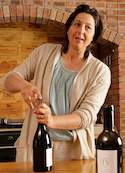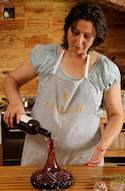Rianie and Louis met in mid-1990 as assistant winemakers, he to Nico van der Merwe at Saxenburg and she to Jean Daneel at Morgenhof. 'The winemakers mixed in two circles: the top guys were above us and then us assistants all hung out together; we had quite a jol [party].'

Rianie grew up in semi-rural Joostenbergvlakte between Cape Town and Stellenbosch. 'I’m from a typical old-fashioned Afrikaans family; we ate rys, vleis en aartappels [rice, meat, and potatoes]. And we only drank a bit of wine with Sunday lunch.'
Winemaking as a career initially appealed to her enjoyment of science as a subject and a love of the outdoors, which led to a B.Sc. degree in oenology and viticulture at Stellenbosch University from 1989, at a time when not many women were to be found in Cape cellars.
Part-time work with top winemaker [and former Guild member] Jean Daneel at Morgenhof was followed, after graduation, by a decade with this leading Simonsberg winery - serendipitously right across the road from what was part of an old fruit farm and is now Strydom Vineyards after Louis and Rianie bought a piece of land here in 2000.
But back to Morgenhof: cellarmaster from 1999, Rianie formed a redoubtable Cape women-in-wine duo with owner Anne Cointreau [scion of the founders of the famous Cognac house Rémy Martin and spirits company Cointreau]. Travels to Burgundy (Meursault, the home of some great French chardonnays) and Bordeaux during this period inspired her dedication to classical French wine styles.
She's never been shy to say that, for her, the ultimate sense of achievement as a winemaker would be to have one of her wines win the Château Pichon Longueville Comtesse de Lalande Trophy for Best Blended Red at the annual International Wine & Spirit Competition in London. It's a prestigious award, won by just two local labels to date: Kanonkop (three times) and Kaapzicht.
Rianie has been knocking on the door for some time... While at Morgenhof, her premium 2001 Bordeaux-style red blend was voted top New World Red Blend in leading UK wine publication Decanter and, after leaving Morgenhof in 2004, she's been earning accolade after accolade for the wines she's been making under the Haskell label since the 2005 vintage.
Florida-based Preston Haskell bought a small mountainside vineyard called Dombeya in 2002, in an area known as the 'Golden Triangle', for the outstanding track record of mainly its red.
'Preston initially bought it as an investment,' says Rianie. General manager Rob Sainsbury set to rejuvenating and replanting the vineyards - about 15 hectares. The first Dombeya wine, a shiraz, was bottled in 2003, and was later joined by a red blend.
'I’d decided to leave Morgenhof because my kids were starting school and I felt I needed to be there for them.' Rianie was - still is! - a 'Superwoman' of the Cape Winelands: handling a top estate's cellar, turning out champion wines, travelling for learning and marketing purposes, and being a wife (harvesting up to the day before her wedding) and mother to three small children: Jean-Louis, Jacq and Daniele (neatly spaced two years apart over six vintages).
New Challenges

But above and beyond all this, being Rianie, she needed 'a new challenge'. The idea was to 'consult' for smaller top-flight wineries. She found her way to the Helderberg (husband Louis' home turf) via Bilton Wines, where she handled the 2005 vintage.
Before that, through her husband, she'd also heard that Preston Haskell was looking for a winemaker for his brand-new, slick little cellar nearby, designed to make small parcels of super-premium, site-specific, mainly red wines besides the Dombeya wines already on the market. So she handled both the Bilton and Dombeya 2005 vintages.
When Bilton appointed a full-time winemaker later that year, she joined Dombeya permanently. 'But then Rob left and suddenly I was alone, just before the 2006 harvest, dealing with the vineyards, wines, bottling, labelling and marketing: basically, I ended up in charge of everything!'
But again, being Rianie (independent, organised, practical, driven, a perfectionist), she loved it. As consultant winemaker who eventually found herself appointed general manager, she got to help 'create' the property with a team of just four, including a farm manager she trained up in the vineyards and cellar.
When Haskell decided to put his name to the winery and the wines, renaming what was Dombeya Farm, Haskell Vineyards, she knew this was more than just 'an investment'. He also appointed a CEO, Sydney-based Grant Dodd, for business expertise and marketing back-up.
In 2009 she released her first premium reds under the Haskell Vineyards label: the Pillars Syrah and Aeon Syrah, named for the features of their respective single-vineyard sites. A Platter's South African Wines guide five-star rating and numerous national and international accolades followed, including a first-ever triumph for a South African Shiraz in the annual Tri-Nations Challenge against Australian and New Zealand wines!
These were followed soon after by the Haskell IV, made in her much-loved Bordeaux style (so-named after the classic French varietal mix of cabernet sauvignon, merlot, cabernet franc and petit verdot, as well as commemorating the fourth generation to carry the Preston Haskell name).
Commanding premium prices of up to R400 (around $50) a bottle, the Haskell range has subsequently been extended to include a more pocket-friendly but no less vaunted shiraz/cabernet combo, the Haskell II. And there's now the premium Anvil Chardonnay too, made from the variety popularly deemed the red wine lover's white wine. A third syrah from the newly planted Hades block waits in the wings.
Vintage 2009 marked yet another high for Rianie when she was inducted into the Cape Winemaker's Guild. She's currently the only woman among 45 members [as of 2012]. If it were up to her, this should not necessarily be noted, perhaps not even mentioned. Yet, as one of just a handful of the Cape's enduringly successful women winemakers, she cannot avoid recognition as a role model, albeit a reluctant one.
 No meat moussaka with mushroom and potato recipe by Rianie Strydom paired with Haskell Vineyards Pillars Syrah wine....
No meat moussaka with mushroom and potato recipe by Rianie Strydom paired with Haskell Vineyards Pillars Syrah wine.... Rianie Strydom’s ‘porcupine’ roast lamb with lemon, garlic and bay leaves recipe paired with Haskell lV Bordeaux-style red blend....
Rianie Strydom’s ‘porcupine’ roast lamb with lemon, garlic and bay leaves recipe paired with Haskell lV Bordeaux-style red blend....